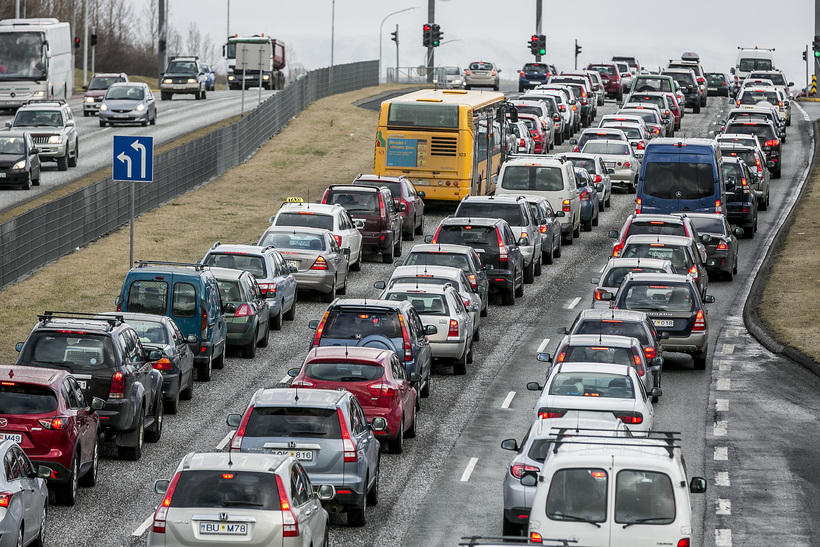Fewer emissions only solution
Given that its energy system is already 99% renewable, Iceland now needs to work on reducing fossil fuels for transport. Photo: Ómar
The only long-term solution to climate change is to reduce greenhouse-gas emissions. Other methods such as carbon capture will, however, remain necessary throughout the transition period over to renewable energy. This is the opinion of Bjarni Diðrik Sigurðsson, Professor at the Agricultural University of Iceland, one of the speakers at the conference on corporate responsibility in climate issues held at the National Power Company of Iceland (‘Landsvirkjun’) yesterday.
Every year for the last decade, humans have on average pumped nine billion tonnes of carbon into the atmosphere. Greenhouse-gas emissions are responsible for global warming, with some predicting the earth will by 4-6°C warmer at the end of this century than before the Industrial Revolution. A worldwide target has been set, however, to keep global warming under 2°C.
Renewable energy only solution
Many speeches at the Landsvirkjun conference dealt with reforestation and carbon capture. In Sigurðsson’s view, though, such methods could never be permanent solutions to climate change caused by greenhouse gases.
“The only permanent solution is to stop using fossil fuels as an energy source.
Other methods do no more than buy us time. They may give us breathing space to change our energy sources but will never solve the long-term problem,” he states.Methods such as carbon capture will, however, be important over the next 10-50 years as we move over to renewable energy.
“We will need all of these methods if we are to reduce the greenhouse effect as much as possible. There is no one right thing to do – we need to use all possible means,” stresses Sigurðsson.
The land, sea and various ecosystems absorb some 60% of the nine billion tonnes of carbon into the atmosphere, according to Sigurðsson, although there are doubts among the scientific community as to whether absorption rates will remain this high. If ecosystems were to become less effective at absorbing and holding carbon dioxide, then greenhouse-gas levels will rise proportionally faster than currently forecast.
Iceland 99% renewable
Iceland has the highest share of renewable energy in the world, with 99% of heat and electricity coming from renewable sources.

Emission reduction in Iceland will depend on reducing the use of liquid fuels in cars, ships and aeroplanes. Photo: Saul Loeb
“We are benefiting from the great work being done all over the world. But Iceland is a small country and these industrial solutions will not be developed here,” admits Sigurðsson. “While other countries are reducing emissions by changing their energy systems, we need to do so by moving on from liquid fuels.”
Liquid fuels need to go
For Sigurðsson, finding the solution to climate change is a moral issue. The problem is a global one and everybody needs to pull their weight.
“We cannot let America and other countries make all the changes and expect just to sit back and benefit. All international agreements on the subject make clear that every country should do what it can to reduce emissions. Our hands are tied in Iceland until we find a permanent solution to replace liquid fuels, as we have already changed our energy systems,” he concludes.









